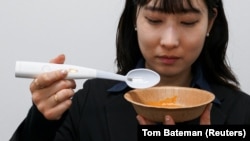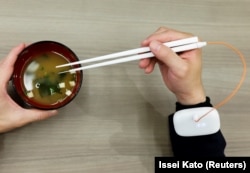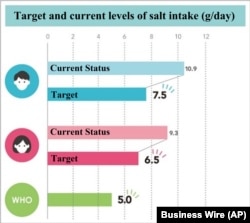Researchers in Japan say they will begin selling new devices that will help people reduce how much sodium, or salt, they use to improve the taste of their food.
The developers are from Japan’s Meiji University and drink company Kirin based in Tokyo.
One new device is an electric spoon. It uses a small computer worn on a person’s arm to send electrical signals to activate sodium atoms. The developers say the signals increase the food’s salty taste.
The Electric Salt Spoon will sell in Japan for around $120 beginning in June. Meiji University professor Homei Miyashita developed the spoon and a similar device, electric chopsticks. The chopsticks will likely go on sale next year.
The recent announcement marks the first time the technology has been used in a product for sale to the public. Last year, the effort gained a different sort of attention. It won the 2023 Ig Nobel Prize in nutrition. Organizers describe the prize as recognizing research that makes "people LAUGH, then THINK.”
How the devices work
The devices both use a weak electrical current to send the sodium ions from food, through the chopsticks or spoon, to the mouth where they create a sense of saltiness, said Miyashita.
"As a result, the salty taste enhances one and a half times," he said.
Miyashita and his laboratory have explored ways that technology can interact with and create human sensory experiences. He has also developed a lickable TV screen that can recreate the taste of food.
The beer producer Kirin is turning to healthcare products to expand its traditional business. A company spokesperson said the technology might be especially useful for Japanese people, whose traditional diet favors salty foods. The average adult in Japan consumes about 10 grams of salt per day. The World Health Organization recommends half that amount.
Eating foods with too much sodium can increase the chances of having high blood pressure, strokes and other health problems.
"To prevent these diseases, we need to reduce the amount of salt we take," said Kirin researcher Ai Sato.
Sato said it is hard to cut salt in the usual way because it would mean “eating bland food."
I’m Jill Robbins.
Tom Bateman, Rikako Murayama and Akiko Okamoto reported on this story for Reuters. Jill Robbins adapted it for Learning English.
______________________________________________
Words in This Story
spoon – n. an eating or cooking tool that has a small shallow bowl attached to a handle
chopsticks – n. either one of a pair of thin sticks that are used especially by people in Asia to pick up and eat food
ion - n. an atom or group of atoms that has a positive or negative electric charge from losing or gaining one or more electrons
enhance - v. to increase or improve something
lickable – adj. able to be touched with the tongue
stroke – n. (medical) a serious illness caused when a blood vessel in your brain suddenly breaks or is blocked
bland – adj. lacking strong flavor
What do you think of the electric spoon and chopsticks? We want to hear from you. Write to us in the Comments Section.













Forum